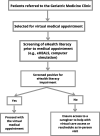Diagnostic accuracy of eHealth literacy measurement tools in older adults: a systematic review
- PMID: 36978033
- PMCID: PMC10049781
- DOI: 10.1186/s12877-023-03899-x
Diagnostic accuracy of eHealth literacy measurement tools in older adults: a systematic review
Abstract
Background: In Canada, virtual health care rapidly expanded during the COVID-19 pandemic. There is substantial variability between older adults in terms of digital literacy skills, which precludes equitable participation of some older adults in virtual care. Little is known about how to measure older adults' electronic health (eHealth) literacy, which could help healthcare providers to support older adults in accessing virtual care. Our study objective was to examine the diagnostic accuracy of eHealth literacy tools in older adults.
Methods: We completed a systematic review examining the validity of eHealth literacy tools compared to a reference standard or another tool. We searched MEDLINE, EMBASE, CENTRAL/CDSR, PsycINFO and grey literature for articles published from inception until January 13, 2021. We included studies where the mean population age was at least 60 years old. Two reviewers independently completed article screening, data abstraction, and risk of bias assessment using the Quality Assessment for Diagnostic Accuracy Studies-2 tool. We implemented the PROGRESS-Plus framework to describe the reporting of social determinants of health.
Results: We identified 14,940 citations and included two studies. Included studies described three methods for assessing eHealth literacy: computer simulation, eHealth Literacy Scale (eHEALS), and Transactional Model of eHealth Literacy (TMeHL). eHEALS correlated moderately with participants' computer simulation performance (r = 0.34) and TMeHL correlated moderately to highly with eHEALS (r = 0.47-0.66). Using the PROGRESS-Plus framework, we identified shortcomings in the reporting of study participants' social determinants of health, including social capital and time-dependent relationships.
Conclusions: We found two tools to support clinicians in identifying older adults' eHealth literacy. However, given the shortcomings highlighted in the validation of eHealth literacy tools in older adults, future primary research describing the diagnostic accuracy of tools for measuring eHealth literacy in this population and how social determinants of health impact the assessment of eHealth literacy is needed to strengthen tool implementation in clinical practice.
Protocol registration: We registered our systematic review of the literature a priori with PROSPERO (CRD42021238365).
Keywords: Computer literacy; Diagnostic accuracy; Digital literacy; E-health literacy; Electronic health literacy; Electronic health literacy tools; Electronic information literacy; Older adults; Systematic review.
© 2023. The Author(s).
Conflict of interest statement
The authors declare no competing interests.
Figures
Similar articles
-
Relationship Between Coronavirus-Related eHealth Literacy and COVID-19 Knowledge, Attitudes, and Practices among US Adults: Web-Based Survey Study.J Med Internet Res. 2021 Mar 29;23(3):e25042. doi: 10.2196/25042. J Med Internet Res. 2021. PMID: 33626015 Free PMC article.
-
Reliability and Validity of the Telephone-Based eHealth Literacy Scale Among Older Adults: Cross-Sectional Survey.J Med Internet Res. 2017 Oct 26;19(10):e362. doi: 10.2196/jmir.8481. J Med Internet Res. 2017. PMID: 29074471 Free PMC article.
-
Comparison of eHealth Literacy Scale (eHEALS) and Digital Health Literacy Instrument (DHLI) in Assessing Electronic Health Literacy in Chinese Older Adults: A Mixed-Methods Approach.Int J Environ Res Public Health. 2023 Feb 13;20(4):3293. doi: 10.3390/ijerph20043293. Int J Environ Res Public Health. 2023. PMID: 36833987 Free PMC article.
-
Performance-Based Measurement of eHealth Literacy: Systematic Scoping Review.J Med Internet Res. 2023 Jun 2;25:e44602. doi: 10.2196/44602. J Med Internet Res. 2023. PMID: 37266975 Free PMC article.
-
Measurement of Digital Literacy Among Older Adults: Systematic Review.J Med Internet Res. 2021 Feb 3;23(2):e26145. doi: 10.2196/26145. J Med Internet Res. 2021. PMID: 33533727 Free PMC article.
Cited by
-
Electronic Health Literacy Scale-Web3.0 for Older Adults with Noncommunicable Diseases: Validation Study.J Med Internet Res. 2024 Jun 3;26:e52457. doi: 10.2196/52457. J Med Internet Res. 2024. PMID: 38830207 Free PMC article.
References
-
- Virtual care in Canada | CIHI. [cited 2023 Jan 27]. Available from: https://www.cihi.ca/en/virtual-care-in-canada.
Publication types
MeSH terms
LinkOut - more resources
Full Text Sources
Medical



